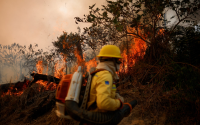 Modelling is used to work out possible future scenarios |
They warned that climate models might have grossly underestimated the rises in temperature that will soon occur.
The team called for a major shift to cleaner fuel technologies to constrain the rapid growth in greenhouse gases.
"We're in the middle of a large, uncontrolled experiment on the only planet we have," said Don Kennedy, the editor-in-chief of Science magazine.
"Global warming has taken place and at our present rate of doing business, there is going to be a lot more of it and it will have serious consequences," added the co-organiser of the open gathering of researchers in Washington DC.
Room for doubt?
The Intergovernmental Panel on Climate Change, established by the World Meteorological Organization and the United Nations Environment Programme, has reported a 0.6C rise in the Earth's mean global surface temperature during the 20th Century - with a much greater rise expected in the coming decades.
The researchers, who met at the American Association for the Advancement of Science (AAAS), urged US policymakers and the public not to get hung up on the uncertainties that still surrounded climate science - and not to use gaps in knowledge as an excuse for inaction.
"A combination of the models and the data, including the deep-past climate records, are really pretty convincing that if you increase the carbon dioxide (CO2) levels from today's values of 370 parts per million to a 1,000 ppm - which we are going to do within the next 150 years without a doubt - it is going to be a very different world," said David Battisti, from the University of Washington in Seattle.
"There are good reasons to believe the projections from the models that we have now are actually underestimating the changes."
Michael Oppenheimer, from Princeton University, added: "The overall message is that the science has been pointing in the same direction for a long time now; and it's time for politicians to sit up, take notice and actually start to act on the problem, as political leaders are doing in other parts of the world."
Time demand
President George Bush has pulled away from the global climate initiative, known as the Kyoto Protocol, designed to limit the emissions of greenhouse gases such as CO2.
The White House believes the treaty would gravely damage the US economy.
The administration would prefer to see gas emissions cut not by what it calls the "command and control" of Kyoto, but by voluntary action and development of new energy technologies such as hydrogen-powered fuel cells.
"Because of the time and resources needed to shift to energies and technologies so that you can avoid 1,000 parts per million, you need to start doing things now," Michael Oppenheimer said.
Daniel Schrag, of Harvard University, added that taking precautionary measures now could be viewed as a sort of insurance, "because we have a risk of catastrophe in the future and we have to make an investment in our energy technologies.
"The catastrophe may never happen but that's not why you buy insurance; you buy insurance against the possibility that it might happen."
The other researchers at the AAAS meeting were Joyce Penner, from the University of Michigan; Thomas Crowley, of Duke University; Richard Alley, from Pennsylvania State University; Jerry Meehl, of the National Center for Atmospheric Research; Lonnie Thompson, from Ohio State University; and Chris Field, of the Carnegie Institution of Washington.






